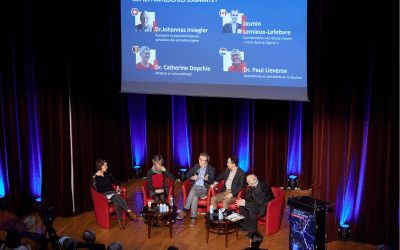A committee of experts at the National Academy of Science (NAS) and the National Academy of Medicine has just published a report proposing guidelines for human genome editing, thus opening the door to the very controversial use of germ cells from human embryos and gametes.
Currently, heritable germline editing, for creating babies, is not allowed in the United States, nor in France or in many other countries around the world. China, Sweden, and the UK on the contrary have started experimentations on human embryos in-vitro. For the time being no “genetically modified” child has been born from this technique.
Calling for caution the report recommends that gene editing on human reproductive cells or embryo ‘should only be allowed for treating or preventing severe disease”, under stringent oversight.
The committee evaluated the general applications of these techniques giving specific recommendations for each case:
– The current regulatory framework for basic research on somatic or embryonic cells or on gametes should continue to be implemented, according to the committee.
The experts claim this research is needed for fertility and human reproduction, without affecting future generations. This could lead to the discovery of possible applications for modifications in transmissible genetic elements. The last point demonstrates that the very nature of this research raises serious ethical issues.
- Allowing the use of this technique for patients with degenerative or hereditary genetic diseases, or cancer: as long as the genetic modifications are not transmitted to future generations, the issues are mainly on the safety of this technique.
Nevertheless the committee advised that genetic editing should only be undertaken for therapeutic purposes to treat or prevent disease, and for no other purposes.
In June 2015, the US National Institute of Health (NIH) gave the green light to the University of Pennsylvania for using the CRISIPR-Cas9 technique to treat cancer.
- A technique which had previously been forbidden, the genetic modification of human embryos and gametes transmissible to future generations could now be allowed for serious conditions by the committee for specific clinical trials.
This would only be allowed in the absence of “reasonable alternatives” and be restricted to editing genes that have been “convincingly demonstrated” to “cause” or “strongly predispose” to a disease.
Le committee recommends strictly forbidding any other non-therapeutic application, for example, enhancement of human traits or choosing some characteristics for the child.
According to Alta Charo, Professor of Law and Bioethics at the University of Wisconsin-Madison and co-chair of the study committee: “genome editing to enhance traits or abilities beyond ordinary health raises concerns about whether the benefits can outweigh the risks, and about fairness if available only to some people.”
Biotechnology specialist, Marcy Darnovsky, director of the “Center for Genetics and Society” an American watchdog group for embryo editing is concerned: “Although the report calls for caution, the recommendations are a green light for proceeding with efforts to modify the human germline” – even though such changes could be inherited by the next generation.”
While gene editing technology has progressed very rapidly, many scientists, researchers, international bodies, etc., have warned of its’ potential dangerous applications.
Thus in October 2015, the UNESCO International Bioethics Committee (IBC) called for a ban on editing human DNA of embryos and human reproductive cells.
The European Ethics and Sciences & Technology Group (GEE) published a report in April 2016 on genome modification, underscoring the importance for policymakers’ and citizens’ participation to closely examine the ethical considerations.
Alliance VITA
has already sounded the warning for risks of genetic manipulation involving human reproductive cells or embryos, particularly via our STOP GM Baby awareness campaign. “This recommendation opens the door to all kinds of abuse. Europe has an important role to play to offset this opinion. Currently the Council of Europe is preparing a report “Genetically Modified Human Beings” demanding for European policymakers to be cautious.”
This report is published just as the patent battle for CRISPR-Cas9 techniques for genetic modification is raging, with highly lucrative financial gains at stake.



